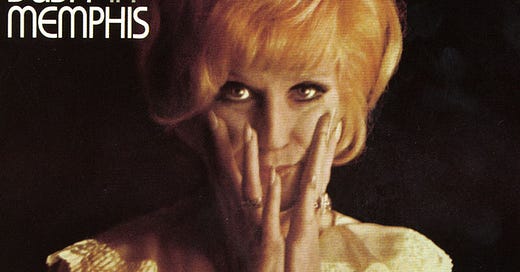Genre of the Day - Blue-Eyed Soul
Album of the Day - Dusty in Memphis by Dusty Springfield (1969)
August 23, 2024
For all the joy and fascination in discovering the nuances and stories behind different genres, it’s all too easy to forget that genre classification in industry practice can yield results that reflect uncomfortable societal undertones. Blue-eyed soul is the clearest example of those factors in action, and though the genre primarily arose in the 1960s, the same concerns over genre definition merit deeper examination to allow all artists more autonomy and more freedom to transcend the tediousness of boundary.
For decades of American radio, seemingly no matter the actual content of music being produced, the color of one’s skin has dictated placement along thinly veiled racialized lines. Urban radio is a catch-all umbrella for genres mostly produced by Black artists to this day. Though radio may not have quite the hold it used to, and streaming can be credited for perhaps producing a more amorphous and boundary-spanning musical world, major Black artists have recently rightfully expressed disappointment with classifications they find reductive. Earlier this year, SZA pointed out that the only reason her projects spanning electronic, soul, folk, and what she calls “glitter trap” ultimately only get pinned under R&B is because she’s Black. Tyler, the Creator decried the Grammys for awarding IGOR with Best Rap Album as a backhanded compliment, as he felt the term’s narrow scope pigeonholed the unconstrained project.
Blue-eyed soul represented a curious reversal of the phenomenon. In the mid-‘60s, an increasing crop of white artists, going against the grain of rock’n’roll’s blazing fire, were smitten with soul and R&B music. It stands to reason that the cross-racial proliferation of R&B records thanks to the pioneering efforts of Motown and its spiritual predecessors like doo-wop inspired these artists like the Righteous Brothers (who coined the term with their 1964 album), The Walker Brothers, and across the pond blue-eyed soul’s most enduring proponent in Dusty Springfield. The UK’s love for soul is evident in their love affair with northern soul, and in later students of the genre like Amy Winehouse and Adele. Musically, blue-eyed soul artists merged soft pop sensibilities with soul and gospel overtones buttressed by big voices to match the high vocal expectations of soul and gospel, a tension that results in quandaries like labels choosing not to display later blue-eyed soul singers like Bobby Caldwell or Teena Marie on their album covers to sidestep confusion about these white artists making music that “sounded Black.”
Is blue-eyed soul an unnecessary term given how little it musically departs from any other soul music, or a necessary term to denote a curiosity of race and music? It’s an artifact of the disheartening reality of race’s intersection with music either way. A silver lining is in the artists it helped catapult to fame, and Dusty Springfield was a veritable talent. Across a variety of styles, her 1969 effort Dusty in Memphis is a soul touchstone of its era, regardless of eye color. The sweeping string ornamentation of “Just a Little Lovin’” brushes gorgeously against her voice, which tends to build from conversationally gentle to earnestly emotive with a well-studied tact. She carries over the luscious horns and twiddling bass groove of Aretha Franklin-rejected “Son of a Preacher Man” with a natural ease—she doesn’t attempt to play it up to the levels Franklin might’ve, furnishing her efforts as not those of imitation but appreciation. The tender devastation of “I Don’t Want to Hear it Anymore” pierces the emotional heart of the best soul masterfully. It’s a testament to the hope that artists of any creed should be able to experiment, coming with grace and respect, with the sounds that capture their spirits, a hope that remains relevant to this current moment of music.





Dusty was a treasure, even outside of music. She was a staunch anti-racist and was kicked out of South Africa for refusing to play to segregated crowds. She was also the first pop star to come out of the closet (1970) and became a hero in the queer community. Beyond the music, she was such an underrated and important influence on popular culture. She’s one of my favorite queer icons.
https://songsthatsavedyourlife.substack.com/p/no12-son-of-a-preacher-man-dusty
Always loved this stuff. This caught my eye: "The UK’s love for soul is evident in their love affair with northern soul,..." The Brits of course also fell in love with Blues, which spawned almost all of what we call Rock and Roll. I assume you will at some point take on the British Blues movement--I'm looking forward to seeing how you parse that. It seems much bigger than a genre!